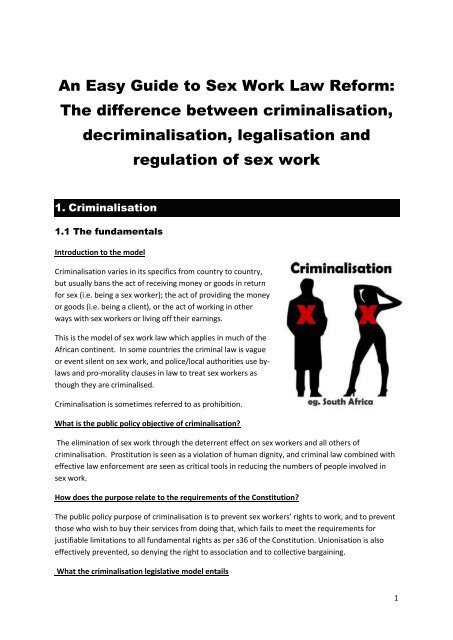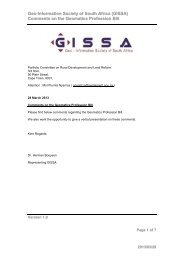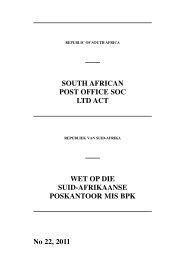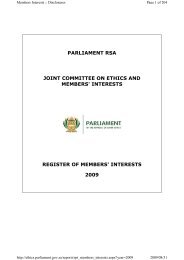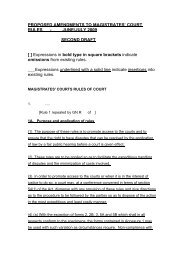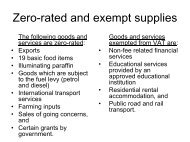An Easy Guide to Sex Work Law Reform - Parliamentary Monitoring ...
An Easy Guide to Sex Work Law Reform - Parliamentary Monitoring ...
An Easy Guide to Sex Work Law Reform - Parliamentary Monitoring ...
You also want an ePaper? Increase the reach of your titles
YUMPU automatically turns print PDFs into web optimized ePapers that Google loves.
<strong>An</strong> <strong>Easy</strong> <strong>Guide</strong> <strong>to</strong> <strong>Sex</strong> <strong>Work</strong> <strong>Law</strong> <strong>Reform</strong>:<br />
The difference between criminalisation,<br />
decriminalisation, legalisation and<br />
1. Criminalisation<br />
1.1 The fundamentals<br />
Introduction <strong>to</strong> the model<br />
regulation of sex work<br />
Criminalisation varies in its specifics from country <strong>to</strong> country,<br />
but usually bans the act of receiving money or goods in return<br />
for sex (i.e. being a sex worker); the act of providing the money<br />
or goods (i.e. being a client), or the act of working in other<br />
ways with sex workers or living off their earnings.<br />
This is the model of sex work law which applies in much of the<br />
African continent. In some countries the criminal law is vague<br />
or event silent on sex work, and police/local authorities use bylaws<br />
and pro-morality clauses in law <strong>to</strong> treat sex workers as<br />
though they are criminalised.<br />
Criminalisation is sometimes referred <strong>to</strong> as prohibition.<br />
What is the public policy objective of criminalisation?<br />
The elimination of sex work through the deterrent effect on sex workers and all others of<br />
criminalisation. Prostitution is seen as a violation of human dignity, and criminal law combined with<br />
effective law enforcement are seen as critical <strong>to</strong>ols in reducing the numbers of people involved in<br />
sex work.<br />
How does the purpose relate <strong>to</strong> the requirements of the Constitution?<br />
The public policy purpose of criminalisation is <strong>to</strong> prevent sex workers’ rights <strong>to</strong> work, and <strong>to</strong> prevent<br />
those who wish <strong>to</strong> buy their services from doing that, which fails <strong>to</strong> meet the requirements for<br />
justifiable limitations <strong>to</strong> all fundamental rights as per s36 of the Constitution. Unionisation is also<br />
effectively prevented, so denying the right <strong>to</strong> association and <strong>to</strong> collective bargaining.<br />
What the criminalisation legislative model entails<br />
1
Prohibition of brothel-keeping<br />
Prohibition of living off/gaining from the earnings of sex workers<br />
Prohibition of receiving money in return for the provision of sexual services<br />
Examples of countries<br />
South Africa, Botswana<br />
1.2 The impact<br />
Impact on sex work - has the law fulfilled its purpose?<br />
Not much – the evidence is that the law has little effect on the number of sex workers or the number<br />
of clients, but a big effect on the behaviour of the police <strong>to</strong>wards sex workers and on the sustaining<br />
of stigma <strong>to</strong>wards sex workers.<br />
Impact of criminalisation on sex workers<br />
In South Africa, studies have documented substantial levels of direct violence against sex workers<br />
from clients, non-paying partners and the police (A) as well as structural violence against sex workers<br />
(B). The unequal power relations between sex workers and their sexual partners, heightened in a<br />
criminalised environment, limit sex workers’ ability <strong>to</strong> insist on the use of condoms during sex, thus<br />
increasing their risk of contracting HIV and other STIs (C). Discrimination, prejudices and sexual<br />
moralism of some health care workers create barriers for sex workers <strong>to</strong> access the health services<br />
that they are entitled <strong>to</strong> (D). If sex workers employ someone <strong>to</strong> act as security for them, <strong>to</strong> help<br />
increase their safety, that security person is labelled as a criminal by South African law 1 .<br />
SWEAT recorded approximately 360 reported human rights abuses of sex workers in 2011; however,<br />
based on the number of abuses reported <strong>to</strong> SWEAT, but not reported <strong>to</strong> Police, we believe that<br />
there are far more unreported cases.<br />
The dignity of women is denied in all these aspects. Criminalisation exposes sex workers, who are<br />
overwhelmingly women, <strong>to</strong> massive indignities through their interaction with police and other state<br />
agents, both in the work they do, and if they fall victim <strong>to</strong> crimes.<br />
Impact of criminalisation on sex worker-police relationship<br />
The fact that the work of sex workers is criminalised means that there is no incentive for the police<br />
<strong>to</strong> respect the human rights of sex workers unless they are receiving some financial, sexual or other<br />
benefit in return.<br />
Refer <strong>to</strong> SWEAT website – examples of police abuse of sex workers.<br />
1.3 Evaluation<br />
Criminalisation is necessary <strong>to</strong> prevent the furtherance of conduct abhorrent <strong>to</strong> the public good - the<br />
morals of some are imposed on the whole community, unleashing a new immorality of police abuse.<br />
1 “I Expect <strong>to</strong> be Abused and Have Fear: <strong>Sex</strong> <strong>Work</strong>ers’ Experiences of Human Rights Violations and Barriers <strong>to</strong><br />
Healthcare in Four African Countries” Fiona Scorgie et al, April 2011, African <strong>Sex</strong> <strong>Work</strong>er Alliance<br />
2
Criminalisation is vital if society is <strong>to</strong> uphold moral standards – why is prostitution uniquely harmful<br />
<strong>to</strong> the public good?<br />
What is the morality of law which has no deterrent effect, and exposes sex workers <strong>to</strong> police and<br />
other abuse?<br />
The law and a moral position are not necessarily the same thing.<br />
The clients of sex workers are more likely <strong>to</strong> be violent, and thus sex work should not be<br />
encouraged.<br />
Some research does indicate this, but surely the focus should be on recognising the reality that<br />
sex work will happen and on minimising the threat from clients through good police-sex worker<br />
relationships, and strong incentives against dangerous behaviour by clients.<br />
<strong>Sex</strong> workers work in an inherently violent industry and are (in the main) damaged by posttraumatic<br />
stress disorder and unable <strong>to</strong> make rational decisions for themselves.<br />
xxxxx<br />
1.4 Would it work in South Africa? If not, why not?<br />
It is in operation in South Africa for 55 years (although clients were only criminalised in 2007). It<br />
fails in its policy aim.<br />
Impact of criminalisation on issues<br />
Numbers of sex<br />
workers<br />
Australian research shows decriminalisation does not increase numbers of sex<br />
workers. <strong>Sex</strong> work industry had increased, in spite of 55 years of<br />
criminalisation<br />
Eastern Cape report on Violence against sex workers 2<br />
Violence against<br />
sex workers<br />
Leaving sex work Criminal records prevent job seeking<br />
Psychological and emotional impact of criminalisation.<br />
Trafficking A hidden sex industry. No motivation <strong>to</strong> engage with the police.<br />
Under-age sex A hidden sex industry. No motivation <strong>to</strong> engage with the police, no access by<br />
work<br />
social service agencies, and incentives <strong>to</strong> report<br />
Affected<br />
Communities are disempowered by a criminalisation law, since the long term<br />
neighbourhoods solutions – engagement directly with sex workers – is not incentivised.<br />
Criminalisation in relation <strong>to</strong> the SWEAT Test:<br />
Safe from police abuse: can sex workers work without fear of police abuse?<br />
<strong>Work</strong>ers rights: are the labour rights of those in the industry protected full?<br />
Exit: can sex workers leave the sex industry of their own free will without fear of prejudice?<br />
Access <strong>to</strong> health care: can sex workers access respectful health care services?<br />
Trafficking and child sexual exploitation: can sex workers report crimes like trafficking and child<br />
exploitation without fear?<br />
2 “A Snapshot of <strong>Sex</strong> <strong>Work</strong>ers’ Experiences of Human Rights Violations and Barriers <strong>to</strong> Healthcare in East<br />
London, South Africa” Prince Nare December 2011, SWEAT, UNFPA<br />
3
References<br />
A - Campbell 2000; Pettifor, Beksinska et al. 2000; Vetten and Dladla 2000; Gould and Fick 2008<br />
B - CORMSA 2011; Scorgie, Chersich et al. 2011; Scorgie, Naka<strong>to</strong> et al. 2011; Vearey, Oliveira et al.<br />
2011<br />
C - Varga 1997; Varga 2001; Pauw and Brener 2003<br />
D - Nairne 1999; Stadler and Delany 2006; Oliveira and Lety 2011<br />
4
2. Decriminalisation<br />
2.1 The fundamentals<br />
Introduction <strong>to</strong> the model<br />
Decriminalisation is the only rights-based approach <strong>to</strong> sex<br />
work law. Prostitution-related criminal law which is not<br />
designed <strong>to</strong> protect the rights of sex workers is repealed.<br />
<strong>Sex</strong> workers have the right <strong>to</strong> work without artificial and<br />
arbitrary (unjustifiable) limitation, and brothels operate as<br />
ordinary businesses. <strong>Law</strong>s protecting the rights of sex<br />
workers and offering protection from the special risks in<br />
their job are put in place. Existing laws govern objectionable<br />
behaviour by sex workers.<br />
What is the public policy objective of decriminalisation?<br />
Acceptance of the reality and inevitability of the existence of<br />
sex work. Recognition of the human rights and right <strong>to</strong> work<br />
of sex workers. Avoiding the sex industry going underground. Constructive relationships between<br />
police and sex workers.<br />
How does the purpose relate <strong>to</strong> the requirements of the Constitution?<br />
It is aligned with the Constitution, as a rights-based approach.<br />
What the decriminalisation legislative model entails<br />
A fully decriminalised system of sex work (law and policy changes) does not mean “no law on sex<br />
work”. It would involve the following:<br />
the removal of laws which make sex workers, clients and others involved in sex work in<strong>to</strong><br />
criminals because of the sex work they are involved in;<br />
preventing local councils from making by-laws which can be used unfairly against sex workers;<br />
but allowing restrictions on offensive signage<br />
the introduction of new laws which give new protections <strong>to</strong> sex workers and their clients, for<br />
example obliging clients <strong>to</strong> practice safer sex and brothel owners <strong>to</strong> promote safer sex, giving<br />
sex workers the same labour and occupational health and safety protections that other workers<br />
have.<br />
promoting human dignity, so that discrimination on the basis that someone is a sex worker or<br />
has been a sex worker would be illegal;<br />
continued laws against public indecency.<br />
Examples of countries<br />
5
New Zealand; New South Wales, state of Australia<br />
2.2 The impact<br />
Impact on sex work - has the law fulfilled its purpose?<br />
a. Decriminalisation of sex work has happened, and has been successful from the viewpoint<br />
of communities, sex workers, police and the Government. It was introduced in New South<br />
Wales (a state/province in Australia) from 1995, and in New Zealand from 2003.<br />
The New Zealand law contained a 5-year review process, and its report in 2008 had positive<br />
outcomes, with:<br />
no evidence of an increase in the number of sex workers, of increased trafficking, or of more<br />
under-age sex workers.<br />
evidence of much better relationships between police and sex workers, of both police and sex<br />
workers taking clients and owners <strong>to</strong> court for abusive behaviour, and of government agencies<br />
with responsibility for the rights and safety of employees gaining expertise in how <strong>to</strong> inform and<br />
protect sex workers from harm.<br />
reports from sex workers of improved working conditions and well-being, feeling safer under<br />
the new legal framework, and being able <strong>to</strong> negotiate safer sex and <strong>to</strong> report abuse <strong>to</strong> police. 3<br />
Studies indicate that the harm reduction-focussed decriminalisation approach in New Zealand<br />
has yielded positive results, especially in terms of reducing transmission of HIV and other<br />
diseases.<br />
There is proof that decriminalisation promotes engagement with public health services. A study<br />
(A) compared the health coverage in three Australian cities with different legal frameworks for sex<br />
work:<br />
a. More Sydney sex workers (in the decriminalised state of New South Wales) reported a sexual<br />
health centre as a source of safer-sex training and information:<br />
Sydney (decriminalised) 52%<br />
Melbourne (legalised) 33%<br />
Perth (criminalised) 35% (p
A and B detailed below give specific evidence of benefits. C concluded: “The positive outcomes<br />
resulting from the PRA [Prostitution <strong>Reform</strong> Act] were seen as significant. <strong>Sex</strong> workers were no<br />
longer considered criminals, and they could earn a living as a sex worker without fear of being<br />
prosecuted and having <strong>to</strong> live with the stigma associated with criminal convictions. They now had<br />
rights similar <strong>to</strong> those working in other occupations, and were able <strong>to</strong> take legal action against those<br />
who denied them these rights. They were better able <strong>to</strong> negotiate safer-sex practices and seek<br />
assistance from the Police over issues of safety. Providing assistance <strong>to</strong> sex workers was also seen <strong>to</strong><br />
be easier – as sex workers were more accessible, and barriers <strong>to</strong> discussing illegal behaviour had<br />
been removed.’<br />
This is the preferred legal model by sex workers and for sex workers, since it is based on their rights,<br />
and offers the potential for free choice around entry, activity and exiting.<br />
Impact of decriminalisation on sex worker-police relationship<br />
Improvement researched and reported in New Zealand – see B<br />
2.3 Evaluation: Claims made about decriminalisation, responses<br />
Decriminalisation is the only one of the four legal approaches <strong>to</strong> sex work which offers a win-win<br />
solution -<br />
it costs the government much less money <strong>to</strong> enforce (e.g. policing, court costs);<br />
for sex workers it makes it easier <strong>to</strong> get HIV prevention and treatment services, and other<br />
health services, and dramatically changes the basis of their relationship with the police;<br />
it gives communities affected by sex work new opportunities <strong>to</strong> engage directly with sex<br />
workers and their advocates <strong>to</strong> work out solutions; and<br />
it rewards business people who manage brothels and other sex work businesses <strong>to</strong> a high<br />
standard.<br />
The only losers under decriminalisation are those people who make money and get other benefits<br />
out of exploiting people under a criminalised system (e.g. police forcing sex workers <strong>to</strong> give them<br />
bribes <strong>to</strong> s<strong>to</strong>p them being arrested; gangs demanding “protection money” from sex workers).<br />
2.4 Would it work in South Africa? If not, why not?<br />
Decriminalisation of sex work would be right for South Africa because it is human rights-focussed,<br />
it is proven, it is built on a public health model (harm minimisation) and it moves the relationship<br />
between sex workers and the state from a conflict-based relationship with the police (as enforcers of<br />
criminalisation) <strong>to</strong> links through <strong>to</strong> a wide range of government agencies responsible for promoting<br />
welfare, guarding health and safety and protecting labour rights, all of which reinforce fundamental<br />
rights of citizenship. All this builds the dignity of sex workers, the great majority of whom are<br />
women.<br />
Impact of decriminalisation on issues<br />
Numbers of<br />
sex workers<br />
New Zealand research indicated no clear impact on overall numbers involved in<br />
the sex industry, but evidence in two cities – Auckland and Welling<strong>to</strong>n – of a move<br />
from the streets in<strong>to</strong> brothels and escort work.<br />
7
Violence<br />
against sex<br />
workers<br />
The marked improvement in sex worker-police relationships under<br />
decriminalisation was illustrated by 60% of sex workers surveyed after law saying<br />
that (b) they felt that had more power <strong>to</strong> refuse clients under the Prostitution<br />
<strong>Reform</strong> Act than before.<br />
Decriminalisation does not mean protective legislation cannot be introduced, with<br />
the clear intention of ensuring sex workers’ safety, health and labour rights.<br />
Trafficking Decriminalisation has a transformative effect on the police-sex worker<br />
relationship, with a freer flow of information and less sense of inequity, and a<br />
mutual sense of responsibility which comes with greater equity. It follows that<br />
evidence of trafficking – which is an economic and reputational threat <strong>to</strong> adult and<br />
consensual sex workers – would be more likely <strong>to</strong> be passed on from sex workers<br />
<strong>to</strong> the police under decriminalisation.<br />
The New Zealand law attempts <strong>to</strong> combat trafficking by denying immigration<br />
Under-age sex<br />
work<br />
Affected<br />
neighbourhoods<br />
permits <strong>to</strong> anyone who intends <strong>to</strong> work in, invest in or run a sex work business.<br />
Decriminalisation has a transformative effect on the police-sex worker<br />
relationship, with a freer flow of information and less sense of inequity, and a<br />
mutual sense of responsibility which comes with greater equity. It follows that<br />
evidence of involvement by children (under 18) in sex work – which is an economic<br />
and reputational threat <strong>to</strong> adult and consensual sex workers – would be more<br />
likely <strong>to</strong> be passed on from sex workers <strong>to</strong> the police under decriminalisation.<br />
The 2008 Review Committee on the law reform found that only 1.3% of sex<br />
workers were aged under 18.<br />
Decriminalisation changes the relationship between representatives of<br />
neighbourhoods where street sex work takes place and the sex workers<br />
themselves. Unless the behaviour of the sex workers is offensive <strong>to</strong> the point that<br />
it breaches existing and non sex work-specific by-laws, the police are not part of<br />
the equation and some sort of negotiated solution (which itself depends on the<br />
ability of the community leaders and the sex work leaders <strong>to</strong> genuinely represent<br />
those they seek <strong>to</strong> represent) is needed.<br />
Decriminalisation in relation <strong>to</strong> the SWEAT Test<br />
Safe from police abuse: can sex workers work without fear of police abuse?<br />
<strong>Work</strong>ers rights: are the labour rights of those in the industry protected full?<br />
Exit: can sex workers leave the sex industry of their own free will without fear of prejudice?<br />
Access <strong>to</strong> health care: can sex workers access respectful health care services?<br />
Trafficking and child sexual exploitation: can sex workers report crimes like trafficking and child<br />
exploitation without fear?<br />
References<br />
A - Harcourt et al (2010) - Harcourt C, O'Connor J, Egger S, Fairley C.K, Wand H, Chen M.Y, Marshall<br />
L, Kaldor J.M, Donovan B. “The Decriminalisation of Prostitution is Associated with Better Coverage<br />
of Health Promotion Programs for <strong>Sex</strong> <strong>Work</strong>ers.” Aust N Z J Public Health, 34(5):482-6, 2010 –<br />
B - New Zealand Ministry of Justice ‘Review of the Prostitution <strong>Reform</strong> Act 2003’ May 2008.<br />
8
C - E Mossman and P Mayhew ‘Key Informant Interviews - Review of the Prostitution <strong>Reform</strong> Act<br />
2003’Crime and Justice Research Centre, Vic<strong>to</strong>ria University of Welling<strong>to</strong>n, Oc<strong>to</strong>ber 2007. The<br />
authors interviewed a number of sex workers on the Prostitution Review Act.<br />
3. Legalisation<br />
3.1 The fundamentals<br />
Introduction <strong>to</strong> the model<br />
Legalisation involves the state creating and<br />
sustaining various controls over sex workers which<br />
is greater than control over people in most<br />
categories of employment. The specific controls<br />
vary between countries, but typically include being<br />
only allowed <strong>to</strong> work in defined areas and<br />
situations, being required <strong>to</strong> register with the<br />
government and/or being required <strong>to</strong> undergo<br />
regular health tests. Many sex workers end up<br />
being “illegal” because they breach such rules, which - they reasonably argue – only exist because<br />
government seeks <strong>to</strong> control sex workers rather than <strong>to</strong> develop their rights or protects their dignity.<br />
What is the public policy objective of legalisation?<br />
<strong>Sex</strong> work is regarded as a legal occupation. It needs <strong>to</strong> be regulated/controlled through criminal law<br />
or some other type of legislation. <strong>Sex</strong> workers can operate under sex work-specific controls defined<br />
and policed by the state.<br />
How does the purpose relate <strong>to</strong> the requirements of the Constitution?<br />
Legalisation attempts <strong>to</strong> draw fine lines between legal and illegal activity, and in the course of doing<br />
this criminalises a range of consensual and adult activity. That may, as shown in Canada, lead <strong>to</strong><br />
breaches of constitutional principles.<br />
What the legalisation legislative model entails<br />
There is no standard range of elements but they commonly involve one or more of the following:<br />
Registration of sex workers by Government.<br />
Manda<strong>to</strong>ry regular testing for HIV and STIs.<br />
Bans on street work, or establishment of ones where sex work is allowed<br />
Restrictions on brothels, e.g. number of rooms and employees, equipment in each room.<br />
Failure <strong>to</strong> comply with regulations results in a criminal sanction.<br />
Examples of countries : Germany; Mali; The Netherlands; Senegal<br />
9
3.2 The impact<br />
Impact on sex work - has the law fulfilled its purpose?<br />
Not much – the evidence is that the law has little effect on the number of sex workers or the number<br />
of clients, and that most sex workers do not register, and so work illegally. There is evidence in The<br />
Netherlands and Vic<strong>to</strong>ria that there is a concentration of sex workers in large brothels, with the high<br />
level of regulations deterring them from setting up their own businesses.<br />
Impact of legalisation on sex workers<br />
If sex workers fail <strong>to</strong> register, they are breaking the law. In The Netherlands, only around 4% of sex<br />
workers register A, meaning that 96% are criminalised. <strong>Sex</strong> workers refuse or fail <strong>to</strong> register because<br />
they see no purpose in doing so, seeing little benefit from this in terms of their safety or rights, and<br />
they see risks around privacy and the freedom it gives police <strong>to</strong> interfere in their work and lives.<br />
Many are suspicious of the state holding such personal details, including the perceived threat of<br />
exposing their sex work should they choose <strong>to</strong> move on <strong>to</strong> other employment. Many sex workers,<br />
particularly those who want <strong>to</strong> avoid State authorities for other reasons (relating <strong>to</strong> drug use, or<br />
undocumented or illegal migrants) are particularly unlikely <strong>to</strong> register under a legalised system, thus<br />
reinforcing their vulnerability. Other controls, such as regular testing for HIV and STIs, have no<br />
proven public health benefit.<br />
Many brothels also operate illegally – for example, 400 out of 500 in the state of Vic<strong>to</strong>ria in 2002/3 B<br />
Licensing systems discourage sex workers from setting up their own small brothels through stringent<br />
requirements and costs, and possible requirements for planning permission from local councils, and<br />
zoning C<br />
Impact of legalisation on sex worker-police relationship<br />
<strong>Sex</strong> workers operating legally are subject <strong>to</strong> tight policing; sex workers operating illegally are in the<br />
same position as sex workers under criminalisation.<br />
3.3 Impact of legalisation on issues<br />
Numbers of sex<br />
workers<br />
Australian research.<br />
Violence against Effect of legalised and illegal groups of sex workers, and the possible<br />
sex workers banning of street work.<br />
Trafficking Since part of the sex industry remains underground, the necessary<br />
transparency and positive relationship with the police is not there.<br />
Under-age sex Since part of the sex industry remains underground, the necessary<br />
work<br />
transparency and positive relationship with the police is not present.<br />
Affected<br />
neighbourhoods<br />
Depends on the legal position of street sex work.<br />
3.4 Evaluation<br />
10
Claims made about legalisation, response<br />
“The legalisation of prostitution in The Netherlands has had its share of successes and setbacks. In<br />
particular, critics note that while legalisation benefits prostitutes who are residents of the European<br />
Union- who are now able <strong>to</strong> obtain legal, health, and social services- illegal immigrants and other<br />
“undesirables” have been pushed further underground and are thus even more vulnerable <strong>to</strong> violence<br />
and exploitation” - D<br />
“This research shows that the Vic<strong>to</strong>rian [the Australian state of Vic<strong>to</strong>ria] system of law reform and its<br />
associated politics have served <strong>to</strong> reinforce negative views of the sex industry. It is argued that it is<br />
not enough <strong>to</strong> make sex work a legal occupation. Both legisla<strong>to</strong>rs and the general public need <strong>to</strong><br />
consider it a legitimate occupation of choice” – source??<br />
Would it work in South Africa?<br />
If not, why not?<br />
If legalisation is <strong>to</strong> be enforced seriously and not just be agreed and then ignored, it involves the<br />
state in considerable regula<strong>to</strong>ry expense and involves police in significant volumes of work. It is<br />
particularly difficult <strong>to</strong> operate in an environment such as South Africa, where around 70% of sex<br />
work is street-based.<br />
Most regulations of sex work are unnecessary and unreasonable in that they serve no purpose other<br />
than <strong>to</strong> target sex workers and treat them differently than other people; it is the states’ rather than<br />
the sex workers’ agenda. Regulations prohibiting offensive behaviours already exist in the national<br />
and municipal by-laws of most democratic countries. Examples in South Africa are public indecency<br />
and loitering laws. In fact, under criminalisation, these are the laws which are frequently used <strong>to</strong><br />
arrest sex workers working outdoors. To then enact further regulations specifically targeting the<br />
offensive behaviour against sex workers would amount <strong>to</strong> unfair and unreasonable discrimination on<br />
the basis of type of work ( in this case sex work).<br />
References<br />
The Challenge of Change: A Study of Canada’s Criminal Prostitution <strong>Law</strong>s. Report of the Standing<br />
Committee on Justice and Human Rights Art Hanger, M.P. Chair December 2006<br />
(http://www.parl.gc.ca/Content/HOC/Committee/391/SSLR/Reports/RP2610157/391_JUST_Rpt06_<br />
PDF/391_JUST_Rpt06-e.pdf) Not Up <strong>to</strong> the Challenge of Change: <strong>An</strong> analysis of the report of the<br />
Subcommittee on Solicitation <strong>Law</strong>s Briefing Paper | February 2007<br />
(http://www.aidslaw.ca/publications/interfaces/downloadFile.php?ref=975)<br />
B – Prostitution: A Review of Legislation in Selected Countries K Hindle; L Barnett; L Casavant Legal<br />
and Legislative Affairs Division, <strong>Parliamentary</strong> Information and Research Service 20 November 2003,<br />
revised 19 November 2008 Parliament of Canada 2008<br />
(http://www.parl.gc.ca/Content/LOP/ResearchPublications/prb0329-e.pdf)<br />
C – as B<br />
D – as B<br />
Decriminalisation in relation <strong>to</strong> the SWEAT Test<br />
11
Safe from police abuse: can sex workers work without fear of police abuse? unless they are<br />
registered;<br />
<strong>Work</strong>ers rights: are the labour rights of those in the industry protected full? X unless they are<br />
registered<br />
Exit: can sex workers leave the sex industry of their own free will without fear of prejudice? X unless<br />
they are registered, and restrictions on sex work are frequently unnecessary, unreasonable and<br />
discrimina<strong>to</strong>ry; <br />
Access <strong>to</strong> health care: can sex workers access respectful health care services? only if they are<br />
registered, and the need for registration may discourage access <strong>to</strong> health care.<br />
Trafficking and child sexual exploitation: can sex workers report crimes like trafficking and child<br />
exploitation without fear? To some extent, but relationships between police and sex workers are<br />
still strained, illegal industry still exists and those working within it don't come forward with<br />
information (and are themselves vulnerable)<br />
12
4. Partial criminalisation<br />
4.1 The fundamentals<br />
Introduction <strong>to</strong> the model<br />
This approach involves the sex worker not being<br />
criminalised for their work, while everyone else who works<br />
with them is criminalised, including their clients and people<br />
acting as security guards for them. The evidence from<br />
Sweden is that it reduces incentives on clients <strong>to</strong> behave<br />
well <strong>to</strong>wards sex workers, and forces sex workers in<strong>to</strong> the<br />
shadows (A) (B). <strong>Sex</strong> workers are treated as victims but<br />
without the rights of victims, with their dignity denied.<br />
The model is sometimes referred <strong>to</strong> as “neo-abolitionlist”.<br />
What is the public policy objective of partial<br />
criminalisation?<br />
On the basis that sex work violates a person’s human rights, and that there is no such thing as free<br />
choice in this matter so that sex work in all its forms constitutes the sale and consumption of human<br />
bodies, it seeks the abolition of sex work, through the removal of demand. They see prostitution as a<br />
serious form of male violence against women.<br />
How does the purpose relate <strong>to</strong> the requirements of the Constitution?<br />
South Africa’s Constitutional Court has already found against gender discrimination in sex work law<br />
(S v Jordaan and others 2002), and partial criminalisation/decriminalisation clearly discriminates on<br />
the same basis since the sex worker and client are treated absolutely differently by the law. Thus<br />
this law risks failing constitutional review in South Africa.<br />
What the partial decriminalisation legislative model entails<br />
<strong>Sex</strong> workers cannot be charged for soliciting or for offering sex for payment, but their clients, and<br />
others involved in managing sex workers, are criminalised. Criminal sanctions are imposed<br />
unilaterally on the client or buyer of a sexual service. As distinct from criminalisation, the sale of sex<br />
is not illegal as such, with the seller or sex worker falling outside the reach of criminal prosecution.<br />
As distinct from legalisation, however, the government does not regulate the sex trade industry.<br />
Examples of countries: Israel, Sweden, Norway, Iceland, South Korea.<br />
4.2 The impact<br />
Impact on sex work - has the law fulfilled its purpose?<br />
13
Social services and health outreach report that the existence if the law has made it harder for them<br />
<strong>to</strong> maintain contact with sex workers.<br />
Impact of partial criminalisation on sex workers<br />
Research in Sweden (see references below)<br />
Ironically, partial criminalisation goes further than criminalisation <strong>to</strong> dehumanise and objectify sex<br />
workers by not recognising the seller of sex as an accessory <strong>to</strong> the crime of buying sex. She {the sex<br />
worker} just does not feature at all, with no basis on which <strong>to</strong> participate in the legal procedures<br />
regarding the crime; sex workers are denied legal recognition in the criminal process. The<br />
presumption that it is undesirable <strong>to</strong> criminalise the ”victim” of the crime – the sex worker – is<br />
further contradicted by supplementary legal provisions that clearly criminalise and marginalise sex<br />
workers through other means.<br />
The most significant direct impact of the law on sex workers, however, is the way in which the law<br />
pathologises sex workers. Pye Jakobsson, the international spokesperson for the Rose Alliance,<br />
states that “the message that the law is sending is that everybody is a victim and people are treated<br />
accordingly… The claim is that the law is <strong>to</strong> save sex workers, but in fact, the message of the law is<br />
pushing sex workers further away from society.” In terms of the way in which authorities and<br />
service providers treat sex workers, repeated testimonies indicate that most difficulties occur when<br />
sex workers refuse <strong>to</strong> comply with their imposed victim status. Where sex workers refuse <strong>to</strong> s<strong>to</strong>p<br />
their work, refuse <strong>to</strong> submit <strong>to</strong> being saved and decline <strong>to</strong> cry for help, service provision is often<br />
withheld, rights <strong>to</strong> have alleged rape or abuse reported or prosecuted frequently denied and<br />
parental rights, at times, removed. In other words, when sex workers insist on their own agency they<br />
are persecuted for it. With popular academic and media reports often grouping all sex work,<br />
including stripping, as “prostitution” and reporting strip clubs as “brothels”, sex workers in the broad<br />
sense, and women sex workers in particular, are disempowered and stigmatised. Should sex workers<br />
wish <strong>to</strong> leave the industry, this stigma makes entering the conventional job market particularly<br />
challenging.<br />
The view of sex work taken by the Swedish law is that there can be no such thing as voluntary<br />
prostitution. By emphasising structural subordination of the seller, the will and agency of the sex<br />
worker is regarded as irrelevant or non-existent. If her/his agency in the conduct of selling sex is<br />
acknowledged in individual instances, it is viewed as contrary <strong>to</strong> the perceived public good and is<br />
subordinated <strong>to</strong> it for this reason. The official view is thus that all sex workers are ‘victims’, sexual<br />
objects of patriarchal dominance. This notion of the irrelevance of seller’s consent is central <strong>to</strong> the<br />
laws structure and impact.<br />
The “shamefulness” of purchasing sex is most certainly projected on<strong>to</strong> the seller, exemplified in a<br />
statement by Detective Superintendent Jonas Trolle of the Swedish Police, who said, "It should be<br />
difficult <strong>to</strong> be a prostitute in our society - so even though we don't put prostitutes in jail, we make life<br />
difficult for them". (B) The paradoxical conceptions of sex workers as both victims and participants in<br />
the crime serves <strong>to</strong> marginalise, disempower and cast shame on sex workers.<br />
Impact of partial criminalisation on sex worker-police relationship<br />
14
<strong>Sex</strong> workers are not liable <strong>to</strong> arrest, but since they are normally the people who have the most<br />
evidence about clients and managers, they are liable <strong>to</strong> police pressure.<br />
Offences under the <strong>Sex</strong>köpslagen have been seen as a low priority crimes by police, largely due <strong>to</strong><br />
the low penal value attached <strong>to</strong> the crime. It is reported that investigative difficulties, funding<br />
limitations, higher visibility and the perceived low symbolic value of street-based sex work <strong>to</strong> the<br />
public, have led <strong>to</strong> police efforts focussing largely on street-based work. Police have generally not<br />
undertaken undercover work <strong>to</strong> enforce the law in in-door sex work due <strong>to</strong> the high resource<br />
demands and uncertain results. (B)<br />
Policing of sex workers does not reflect their supposedly “legal” status. For the police,<br />
consequences include the ways in which sex workers’ privacy rights are infringed, how sex workers<br />
are harassed by the police and are subject <strong>to</strong> invasive questioning, surprise visits and privacy<br />
intrusions that would be unacceptable <strong>to</strong> “normal” victims of crime or “regular” citizens. For<br />
example, one sex worker has stated that following a raid during a sex act with a client, police refused<br />
<strong>to</strong> allow her <strong>to</strong> clothe herself, stating that she was “used <strong>to</strong> people seeing her naked” (C) This is what<br />
happens when a law views sex workers as lacking agency and humanity.<br />
Impact of partial criminalisation on issues<br />
Numbers of sex<br />
workers<br />
Violence against<br />
sex workers<br />
See References in Sweden (and critical responses on claimed successes,<br />
based on unknown numbers of sex workers and no adequate baseline for<br />
assessment)<br />
The <strong>Sex</strong>köpslagen requires that the legal capacity of the sex worker <strong>to</strong><br />
consent is completely unacknowledged, <strong>to</strong> the extent that cases of sexual<br />
violence, rape and kidnapping perpetrated against sex workers are<br />
considered simply as aggravated instances of purchasing sex and not as<br />
independent sexual offences liable <strong>to</strong> high sanctions and damages, as<br />
would be the case in circumstances outside of sex work.<br />
Actual statements on increases or declines in sex workers’ exposure <strong>to</strong><br />
violence cannot be motivated statistically: violence against sex workers<br />
has not been recorded systematically by hospitals or police either prior <strong>to</strong><br />
or after the implementation of the ban. However, much qualitative<br />
research and testimonies from sex workers indicate the market <strong>to</strong> be<br />
much <strong>to</strong>ugher and more violent following the ban.<br />
The argument made by critics of the law, (including a number of sex<br />
workers both currently still working and retired from the trade) is that the<br />
law has made the “decent clients” disappear. Faced with a diminished<br />
pool of “good purchasers” sex workers are now faced with having <strong>to</strong><br />
negotiate with less trustworthy clients: “You just can’t afford <strong>to</strong> ignore the<br />
assholes anymore” (Pye Jakobsson). This forces sex workers who are<br />
reliant on their work for income <strong>to</strong> expose themselves <strong>to</strong> more dangerous<br />
clients and riskier situations that expose sex workers <strong>to</strong> increased violence<br />
(and yet flimsy legal redress).<br />
Leaving sex work Research in Sweden<br />
Trafficking In some respects in Sweden, the law has been harmful <strong>to</strong> the reporting<br />
and policing of trafficking. A perception exists that prior <strong>to</strong> the law, it was<br />
typically purchasers or clients who reported instances of trafficking and<br />
abuse <strong>to</strong> the police. A number of testimonies and reports now<br />
acknowledge that clients, due <strong>to</strong> fear of their own criminal prosecution<br />
15
Under-age sex<br />
work<br />
4.3 Evaluation<br />
under the ban, are now hesitant <strong>to</strong> report or evidence instances of abuse<br />
or trafficking <strong>to</strong> the authorities. In one instance, a sex worker has<br />
reported as having <strong>to</strong> function as an intermediary for fearful clients<br />
wishing <strong>to</strong> report abuses: resulting in clients reporting concerns <strong>to</strong><br />
sympathetic sex workers, who may then relay suspicions of abuse of third<br />
parties <strong>to</strong> the police (B).<br />
As above<br />
Claims made about partial criminalisation, responses<br />
Thus, while quantitative evidence is sparse, it is clear that despite not including sex workers in the<br />
criminal sanction, the ban serves <strong>to</strong> drive sex work underground. No longer allowed <strong>to</strong> be visible <strong>to</strong><br />
acceptable society, the dangers of pressured negotiations and a narrowing of safe options forces sex<br />
workers, particularly those already more vulnerable <strong>to</strong> abuse, in<strong>to</strong> riskier exchanges.<br />
The practices of the police, prosecu<strong>to</strong>rs and courts is <strong>to</strong> ignore allegations of rape and abuse made<br />
by sex workers and <strong>to</strong> charge a person who has committed an act of non-consensual sex with a sex<br />
worker merely as “gross purchasing of sex” and not as rape; these are judicially sanctioned<br />
violations of sex worker’s dignity and rights <strong>to</strong> their physical and psychological integrity. The legal<br />
presumption that all sex workers are exploited and subordinated by their clients leads <strong>to</strong> the<br />
presumption that sex workers are unable <strong>to</strong> consent <strong>to</strong> have sex in return for pay, but that they are<br />
always coerced. The concrete consequence of the law’s normative influence is a chilling violation of<br />
sex workers’ rights <strong>to</strong> be acknowledged in the most basic way as socially-relevant human beings,<br />
bearing the capacity <strong>to</strong> decide on their own physical integrity. In trial, sex worker have neither the<br />
rights of the accused nor the victim but are merely objects of evidence against purchasers, whose<br />
true abuses are trivialised as expected conditions in the sex trade. The practice is discrimina<strong>to</strong>ry and<br />
reduces sex workers <strong>to</strong> second class citizens whose perpetra<strong>to</strong>rs, when they are truly sexually or<br />
physically violated outside of their consent, are subject <strong>to</strong> lower penalties. 4<br />
References<br />
A – The Jordon Case ( S v Jordan and Others (<strong>Sex</strong> <strong>Work</strong>ers Education and Advocacy Task Force and<br />
Others as Amici Curiae (CCT31/01) [2002] ZACC 22; 2002 (6) SA 642; 2002 (11) BCLR 1117 (9 Oc<strong>to</strong>ber<br />
2002) http://www.saflii.org/za/cases/ZACC/2002/22.html<br />
B – <strong>An</strong>nabel Raw, Masters student research (used above) , unpublished, and see also The Swedish<br />
<strong>Sex</strong> Purchase Act: Claimed Success and Documented Effects By Susanne Dodillet and Petra Östergren<br />
Conference paper presented at the International <strong>Work</strong>shop: Decriminalizing Prostitution and<br />
Beyond: Practical Experiences and Challenges. The Hague, March 3 and 4, 2011<br />
C – Impacts of the Swedish Criminalisation of the Purchase of <strong>Sex</strong> on <strong>Sex</strong> <strong>Work</strong>ers Presented at the<br />
British Society of Criminology <strong>An</strong>nual Conference, Northumbria University. Jay Levy. 4th July 2011<br />
D- THE BAN ON PURCHASING SEX IN SWEDEN: THE SO-CALLED ‘SWEDISH MODEL’ by Bob Wallace,<br />
Principal Policy Officer, Office of the Prostitution licensing Authority Authority of Queensland<br />
Undated (http://www.traffickingpolicyresearchproject.org/Purchasing<strong>Sex</strong>Sweden.pdf); <strong>An</strong>d: SWAN<br />
16
(<strong>Sex</strong> <strong>Work</strong>ers Rights and Advocacy Network Central and Eastern Europe) Video titled: Sweden: “We<br />
want <strong>to</strong> save you. <strong>An</strong>d if you don’t appreciate it, we will punish you!” Interview with Pye Jacobsson<br />
(http://swannet.org/node/1512)<br />
Decriminalisation in relation <strong>to</strong> the SWEAT Test<br />
Safe from police abuse: can sex workers work without fear of police abuse? <br />
<strong>Work</strong>ers rights: are the labour rights of those in the industry protected full? , criminalised, whilst<br />
sex work is not illegal, the criminalisation of the buying of sex is a refusal in law <strong>to</strong> accept sex work as<br />
work<br />
Exit: can sex workers leave the sex industry of their own free will without fear of prejudice? no<br />
criminal record, but stigma still present<br />
Access <strong>to</strong> health care: can sex workers access respectful health care services? compromised,<br />
stigma still enabled<br />
Trafficking and child sexual exploitation: can sex workers report crimes like trafficking and child<br />
exploitation without fear? <br />
Contact:<br />
Sisonke sex workers movement (021 448 7875)<br />
Toll free 24 hour <strong>Sex</strong> <strong>Work</strong> help line 0800 60 60 60<br />
SWEAT 021 448-7875<br />
Women’s Legal Centre 021 424-5660<br />
Tshwaranang Legal Advocacy Centre 011 403-8230<br />
17


